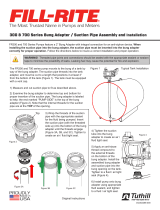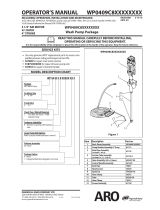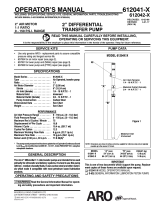Page is loading ...

CCN 81561318
OPERATOR’S MANUAL
650110-X
INCLUDE MANUAL: S-632 GENERAL INFORMATION MANUAL (PN 97999-624)
SEE CHART BELOW
2” DIFFERENTIAL TRANSFER PUMP
(CARBON STEEL)
650115-X
INCLUDING: OPERATION, INSTALLATION & MAINTENANCE
READ THIS MANUAL CAREFULLY BEFORE INSTALLING,
OPERATING OR SERVICING THIS EQUIPMENT.
It is the responsibility of the employer to place this information in the hands of the operator. Keep for future reference.
2” AIR MOTOR
2:1 RATIO
6” STROKE
RELEASED: 3-26-68
REVISED: 9-28-11
(REV.
T)
SERVICE KITS
• Use only genuine AROR replacement parts to assure compatible
pressure rating and longest service life.
• 66098 for repair of 60702 air motor section.
• 637028 for repair of 66198 lower pump end (650110-C) and 66200
lower pump end (650115-C) (UHMW-PE / Polyethylene).
• 637029 for repair of 66198-1 lower pump end (650110-1C) and
66200-1 lower pump end (650115-1C) (PTFE / PTFE).
SPECIFICATIONS
Model Series 65011X-( )...................
Type Air Operated, Transfer Pump........................
Ratio 2:1.........................
Air Motor Diameter 2” (5.08 cm)..............
Stroke (double acting) 6” (15.24 cm)...........
Air Inlet (female) 1/4 - 18 N.P.T.F. - 1...............
Material Outlet (female) 1/2 - 14 P.T.F. SAESpec. Short
........
Material Inlet (female) (650115-X) 1 - 11-1/2 N.P.T.F....
Pump Construction Carbon Steel............
Pump Drum Size / Capacity
650110-C & 650110-1C 55 gallon..........
650115-C & 650115-1C 16 gallon..........
Dimensional Data see chart...............
PERFORMANCE
Air Inlet Pressure Range 0 - 150 p.s.i. (0 - 10.3 bar)..........
Fluid Pressure Range 0 - 300 p.s.i. (0 - 20.7 bar)............
Cycles / Minute Rec’d @ Working Flow 120
Displacement In
3
Per Cycle 8.0........
Volume / Cycle 4.4 oz. (131 ml)..................
Cycles Per Gallon 28.9...............
Accessories Available 61113 mounting bracket
Noise Level @ 90 p.s.i. - 40 c.p.m . . . . . 81 db(A)
The pump sound pressure level has been updated to an
Equivalent Continuous Sound Level (LAeq
) to meet the intent of
ANSI SI.13-1971, CAGI-PNEUROP S5.1 using four microphone
locations.
............
Air Motor 60702
Lower Pump
(see chart below)
Material Inlet
2 - 11-1/2 N.P.T. Bung Thread
Air Inlet (not shown)
1/4 - 18 N.P.T.F. - 1 (female)
Material Outlet (female)
1/2 - 14 P.T.F. SAE Spec. Short
“A”
“B”
Figure 1
MODEL
LOWER
PUMP
“A”
Inches
(mm)
“B”
Inches
(mm)
650110-C 66198 53-3/32 (1349) 33-13/16 (859)
650110-1C 66198-1 53-3/32 (1349) 33-13/16 (859)
650115-C 66200 41-1/16 (1043) 21-25/32 (553)
650115-1C 66200-1 41-1/16 (1043) 21-25/32 (553)
1
1
INGERSOLL RAND COMPANY LTD
209 NORTH MAIN STREET – BRYAN, OHIO 43506
(800) 495-0276 FAX(800) 892-6276
© 2011
www.ingersollrandproducts.com

Page2of8 650110-X
GENERAL DESCRIPTION
The ARO 2” differential, 2:1 ratio transfer pumps have been designed for
the application and transfer of a wide range of corrosive and non-corro-
sive materials. Refer to the lower pump parts list on page 4 for manufac-
tured materials and packings available. These pumps may be directly
mountedin the 2” bung of a standarddrum or when using a 61113mount-
ing bracket, the pump can be mounted on the wall or in an open head
drum.
The air motor is connected to the lower pump end by a spacer tube, this
protects the air motorsection from possible contamination due to normal
wear and eventual leakage of material past the upper material piston
seals.
PUMP RATIO X
INLET PRESSURE TO PUMP MOTOR
=
MAXIMUM PUMP
FLUID PRESSURE
Pump ratio is an expression of the relationship between the pump motor area and the
lower pump end area. EXAMPLE: When 150 p.s.i. (10.3 bar) inlet pressure is supplied
to the motor of a 2:1 ratio pump it will develop a maximum of 300 p.s.i. (21 bar)fluidpres-
sure (at no flow) - as the fluid control is opened, the flow rate will increase as the motor
cycle rate increases to keep up with the demand.
Refer to General Information sheet for safety precautions and important
information.
PUMP SER VICE PROCEDURES
PUMP DISASSEMBLY
RefertoFigure2.
NOTE: All threads are right hand.
1. Thread a 1/2” nipple into the material outlet.
2. Place the 2” differential pump assembly in a vise as shown. Rotate
the pump assemblyso that the 1/2” nipple is resting against the vise.
CAUTION: Do not clamp the pump tightly.
Figure 2
3. Unthread the air motor from the material outlet body by using a strap
wrench on the air motor separating tube.
4. Push the connecting rod, in the lower pump assembly, to one side
and pull down until the air motor separates from the lower pump as-
sembly.
5. The pump is now in two assemblies: air motor and lower pump as-
sembly.
PUMP REASSEMBLY
RefertoFigure3.
1. Place the 2” air motor in a vise with the needle valve or pipe nipple
resting against the jaws of the vise, as shown.
2. Insert the 90826 tip of the lower pump assembly into the 76216 sep-
arating tube of the air motor.
3. Insert the 90826 tip of the lower pump assembly through the outside
edge of the slot in the 76208 plunger tip, center the 90826 tip in the
76208 plunger tip and pull out until the 90826 tip is retained.
4. Thread the air motor into the material outlet body and tighten by us-
ing a strap wrench on the air motor 76216 separating tube.
Figure 3
90826 76216
76208

Page3of8650110-X
2” AIR MOTOR SERVICE PROCEDURES
2” AIR MOTOR DISASSEMBLY
RefertoFigure4.
NOTE: All threads are right hand.
1. Place the air motor in the vise with a needle valve or a 1/4” pipe nip-
ple resting against the jaws of the vise, as shown.
2. Placea strap wrench aroundthe (1) cap and remove the cap. NOTE:
If the (6) cylinder comes off with (1) cap, place the cap in a vise and
use a strap wrench around the cylinder and unscrew from cap.
NOTE: Do not squeeze or use pipe wrench on (6) cylinder.
3. Place a strap wrench around the (6) cylinder and unscrew and re-
move the cylinder.
4. Pull the (7) spacer and piston assembly and (15) plunger out of the
(18) pump body and lay aside.
5. Remove the (17) valve spring and (16) “O” ring from the (18) pump
body.
6. Place the (18) pump body in the vise and loosen the (21) lock ring
with a strap wrench.
7. Place a strap wrench around the (22) separating tube and unthread.
8. Remove the (20) washer and (19) “O” ring from the (18) pump body.
9. Clamp the flats of the (7) spacer and piston assembly in the vise. Re-
move the plunger tip from the (7) spacer and piston assembly.
NOTE: Do not remove the (13) plunger tip from the (15) plunger, un-
less replacing parts.
10. Removethe (12) gasket from the (13) plungertip. NOTE: Do not mar
or damage o.d. of (15) plunger.
11. Remove the three (8) screws from the spacer and piston assembly.
12. Remove the (9) valve plate and (11) valve spacer.
Figure 4
S LoctiteR is a registered trademark of Henkel Loctite Corporation S

Page4of8 650110-X
60702 2’’ AIR MOTOR PARTS LIST
1
2
3
4
5
6
8
9
10
11
12
13
14
15
17
18
19
20
21
22
16
7
93005
Ground Screw
Figure 5
Item Description (size) Qty Part No.
n
Service Kit Parts 66098
1 Cap 1 76073-2
n 2 “O” Ring (3/32” x 2-5/16” o.d.) 1 Y325-138
3 Spring 1 77208
4 Button 1 90638
5 Washer 1 77290
6 Cylinder 1 76074-2
n 7 Spacer & Piston Assembly 1 61088
8 Screw (#4-40x3/8”) 3 Y222-54-C
9 Valve Plate 1 76090
10 Piston Assembly 1 60656
11 Valve Spacer 1 76856
n 12 Gasket 1 F21-53
13 Plunger Tip 1 76208
14 “O” Ring (1/8” x 1-1/4” o.d.) 1 Y325-214
15 Plunger 1 76215
n 16 “O” Ring (3/32” x 2-1/16” o.d.) 1 Y325-134
17 Valve Spring 1 76070
18 Pump Body 1 76077-2
n 19 “O” Ring (0.275” x 1.837” o.d.) 1 77803
20 Washer 1 76075
21 Lock Ring 1 76100
22 Separating Tube 1 76216
2” AIR MOTOR REASSEMBLY
RefertoFigure5.
1. Insert the (11) valve spacer through the bottom of the (10) piston as-
sembly.
2. Place the (9) valve plate on top of the(10) piston assembly (side with
three protrusions) to face (10) piston assembly and align the three
holes with the three posts of the (11) valve spacer.
3. Fasten the (9) valve plate down with the three (8) screws (this is the
(7) spacer and piston assembly). Lay aside.
4. Thoroughly grease the (19) “O” ring and place into the (18) pump
body.
5. Place the (20) washer in the (18) pump body.
6. Screw the (22) separating tube securely to the (18) pump body.
7. Tighten the (21) lock ring.
8. Grease the (16) “O” ring and place over the threads of the (18) pump
body.
9. Place the (17) valve spring into the (18) pump body.
10. Place the (15) plunger with (13) plunger tip through the (22) separat-
ing tube and through the (18) pump body. NOTE: To prevent dam-
age to (19) “O” ring apply light film of grease on (15 and 13)
assembly.
11. Place the (12) gasket over the threads of (13) plunger tip.
12. Screw the (7) spacer and piston assembly onto the (13) plunger tip
and tighten with wrenches, using flats provided.
13. Thoroughly grease the inside of the (6) cylinder and insert it over the
(7) spacer and piston assembly.
14. Thread the (6) cylinder on the (18) pump body.
15. Screw the (1) cap, with (2) “O” ring, (3) spring, (4) button and (5)
washer, in place on the (6) cylinder and tighten with a strap wrench.

Page5of8650110-X
LOWER PUMP SERVICE PROCEDURES
LOWER PUMP DISASSEMBLY
RefertoFigure6.
NOTE: All threads are right hand.
1. Clamp the lower pump assembly in the vise on solid part of (28) pump
body. CAUTION: Clamp the pump so that the three small tubes con-
nected to the lower end of (28) pump body are not being twisted.
2. Place a pipe or strap wrench on the knurled part of the (32) suction tube
and remove the (32) suction tube. CAUTION: Do not place wrench
any other place other than the knurled part of the (32) suction
tube.
3. Grasp the (41) lower piston rod and remove the rod and piston assem-
bly by pulling straight out.
4. Place a socket wrench in the hex end of the (40) inner suction tube and
remove. CAUTION: Do not use any open end or adjustable wrench.
5. Remove the (30 and 31) gaskets.
6. Loosenthe vise and reclamp the pump on the (28) pump body in area of
material outlet hole. CAUTION: Do not clamp directly on outlet hole.
7. Remove (27) tube and washer assembly with a strap wrench.
8. Remove the (24) Truarc ring using Truarc pliers.
9. Remove the (25) washer.
10. Remove the (26) “U” c up.
11. Clamp the (49) foot valve body on flats in vise.
12. Place a pipe wrench on the knurled portion of (32) suction tube. CAU-
TION: Do not place wrench any other place other than the knurled
part of the (32) suction tube.
13. Remove (32) suction tube from (49) foot valve body.
14. Remove (49) foot valve body from vise.
15. Remove (47) ball stop.
16. Remove (48) ball.
17. Clamp the (41) lower piston rod in the vise on flats.
18. Place an open end or adjustable wrench on (34) connecting rod flats.
Remove by turning counterclockwise.
19. Remove the (38) washer.
20. Remove the (39) piston.
21. Remove the (46) elastic stop nut.
22. Remove the (45) washer.
23. Remove the (44) piston.
LOWER PUMP END REASSEMBLY
RefertoFigure6.
CAUTION: Apply anti-seizing compound to all stainless steel threads
unless the service manual calls for loctite.
1. Clamp the (41) lower piston rod on flats in vise. Put the (44) piston in
place as shown (lips up).
2. Put the (45) washer and (46) elastic stop nut in place.
3. Place the (39) piston (lips down) on the (41) lower piston rod.
4. Place the (38) washer on the (41) lower piston rod.
5. Thread the (34) connecting rod to (41) lower piston rod and tighten.
6. Clamp on (28) pump body below the three small tubes. Place the (30
and 31) gaskets in the (28) pump body.
7. Thoroughly grease the inside of the (40) inner suction tube and thread
securely into the (28) pump body.
8. Thoroughly grease the (39 and 44) pistons. Insert the (34) connecting
rod through the (40) inner suction tube and (28) pump body, (33) tip end
first.
9. Thoroughly grease the inside of the (32) suction tube.
10. Insert the (32) suction tube over the (44) piston and thread into the (28)
pump body.
11. Place the (48) ball into the (49) foot valve body.
12. Insert the (47) ball stop into the (49) foot valve body.
13. Thread the (49) foot valve body into the (32) suction tube.
14. Tighten the lower pump section by placing a bar in the bottom slot in the
(49) foot valve body and turn clockwise.
15. Thoroughly grease and install the (26) “U” cup into the (27) tube and
washer assembly.
16. Place the (25) washer into the (27) tube and washer assembly.
17. Insert the (24) Truarc ring into the (27) tube and washer assembly.
18. Insert the (27) tube and washer assembly over the (33) tip and thread
into the (28) pump body.
LOWER PUMP END PARTS LIST
Item Description (size) Qty Part No. Mtl Item Description (size) Qty Part No. Mtl
Z Items included in service kit 637028
V Items included in service kit 637029
24 Truarc Ring 1 76243-1 [C]
25 Washer 1 76214 [Br]
ZV 26 “U” Cup (1/8” x 3/4” o.d.) 1 Y186-47 [B]
27 Tube & Washer Assembly 1 60708 [C]
28 Pump Body (66198 -X) 1 61617 [C]
(66200-X) 1 61618 [C]
29 Bung Adapter Ass’y (includes 50) 1 60870 [C]
ZV 30 Gasket 1 91419 [Ny]
ZV 31 Gasket 1 91491 [Ny]
32 Suction Tube (66198-X) 1 76245 [C]
(66200-X) 1 76245-1 [C]
33 Tip 1 90826 [C]
34 Connecting Rod (66198-X) 1 92153 [C]
(66200-X) 1 92152 [C]
35 Rod & Heli- Coil Ass’y (includes 34 & 36)
(66198-X) 1 91571
(66200-X) 1 91570
36 Heli-Coil 1 91450 [SS]
37 Rod Assembly (includes 33 & 35)
(66198-X) 1 66254
(66200-X) 1 66253
38 Washer 1 91487 [SS]
Z 39 Piston Kit (66198 & 66200) 1 93848-1 [UH]
V (66198-1 & 66200-1) 1 93848-2 [T]
40 Inner Suction Tube 1 76242 [C]
41 Lower Piston Rod (66198-X) 1 91569 [C]
(66200-X) 1 91569-1 [C]
42 Nut (3/8” - 24) 1 Y1 1-106-T [SS]
43 Adapter 1 91485 [SS]
Z 44 Piston (66198 & 66200) 1 91523 [UH]
V (66198-1 & 66200-1) 1 91484 [T]
45 Washer 1 91489 [SS]
46 Elastic Stop Nut (3/8” - 24) 1 Y115-14 [SS]
47 Ball Stop 1 76231 [SH]
48 Ball (0.8125” o.d.) 1 Y16-226 [C]
49 Foot Valve Body (66198-X) 1 76207 [C]
(66200-X) 1 90931 [C]
50 Thumb Screw (1/4” - 20 x 1-1/2”) 1 Y197-158-C [C]

Page6of8 650110-X
LOWER PUMP END PARTS LIST
24
25
26
27
28
29
30
31
32
33
s
34
50
38
39
40
41
42
43
44
45
46
47
48
49
(66198-X)
47
49
(66200-X)
s Apply LoctiteR 271 to threads.
K Apply Loctite Nickel Anti-Seize to threads
J Apply PTFE tape to threads.
Figure 6
MATERIAL CODE
[B] = Nitrile
[Br] = Brass
[C] = Carbon Steel
[L] = Leather
[Ny] = Nylon
[SH] = Hardened Stainless Steel
[SS] = Stainless Steel
[T] = PTFE
[UH] = UHMW-PE
36
s
K
J
J
J
J
35
37

Page7of8650110-X
TROUBLE SHOOTING
Pump continually cycles.
• Checkfor empty material supply. Disconnect the air (fromthe pump)
replenish material supply.
• Check to see if the connecting rod has disassembled from the mat-
ing rod. See assembly of lower pump end (figure 3).
• The (48) ball may be wedged or sticking open in the foot valve body.
NOTE: Replace the ball or the foot valve if either are damaged.
• Check for worn or damaged (39) upper piston.
Material on one stroke only (fast downstroke).
• The ball in the foot valve may not be checking or sealing properly.
Remove theball from foot valve and inspect. If the ball or foot valve is
damaged replace with new parts. If the ball or foot valve is not dam-
aged, thoroughly clean both parts and reassemble (See lower pump
end instructions).
Material on one stroke only (fast upstroke).
• Checkfor worn or damaged (44) lower material piston. Replace pis-
ton (See lower pump end instructions). See Figure 6.
Material leakage out the top of the pump body.
• Check for worn or damaged (39) upper piston. See lower pump end
instructions and replace the upper piston.
• Remove (48) ball from the (49) foot valve body. Thoroughly clean
and replace (see figure 6).
Air leakage out of the exhaust holes. (See Air Motor Instructions)
• Check to see if the (9) valve plate is loose or has disassembled from
the (11) valve spacer.
• Check for worn or damaged (10) piston assembly.
• Check for worn or damaged (19) “O” ring.
• Check for worn or warped (9) valve plate.
• Worn or damaged (14) “O” ring. Replace (14) “O” ring.
OPTIONAL ACCESSORIES
61113 MOUNTING BRACKET
640081-B STRAP WRENCH
Figure 7

Page8of8 650110-X
PN 97999-24
/







